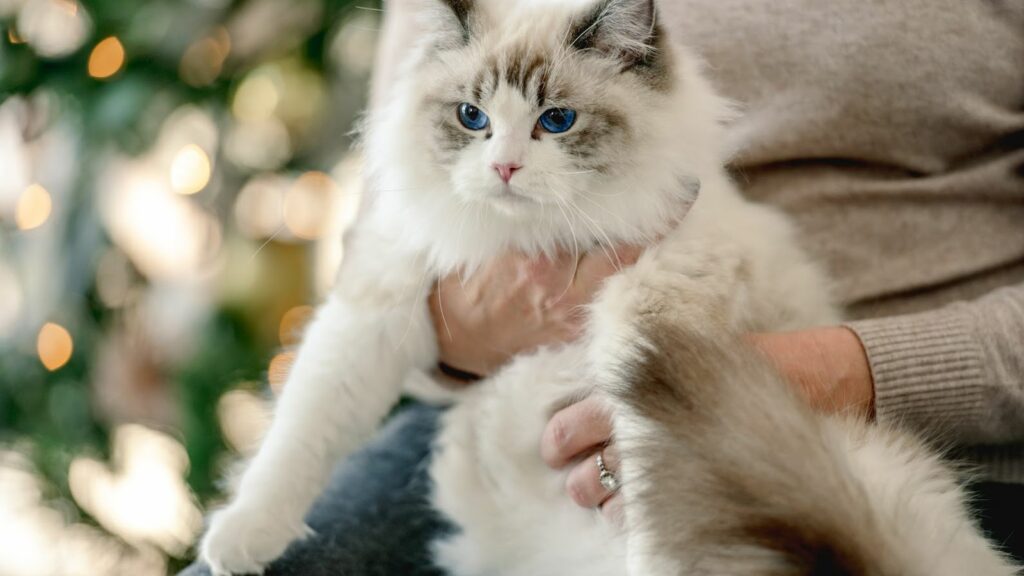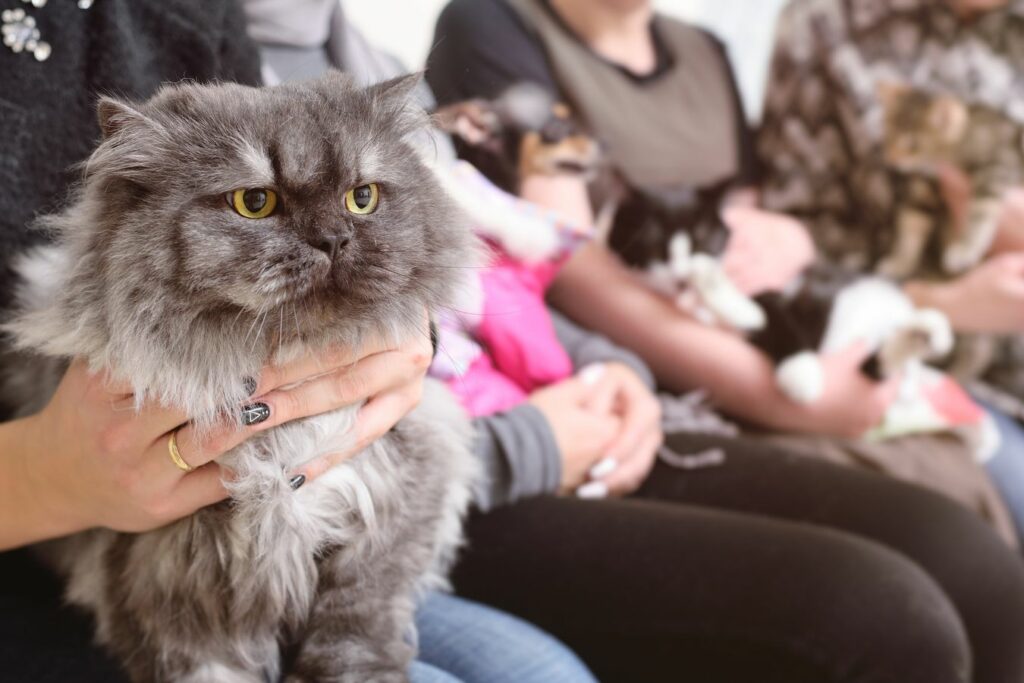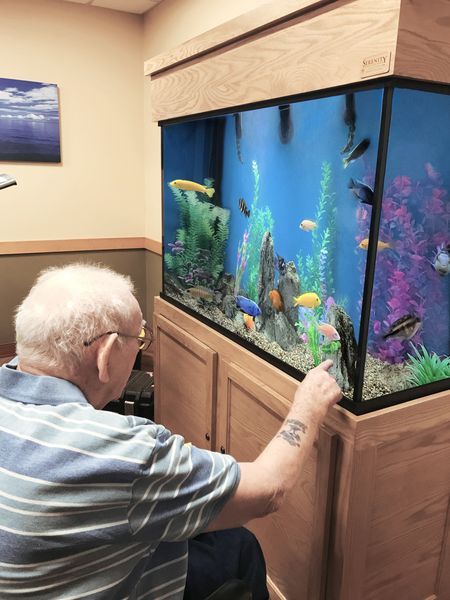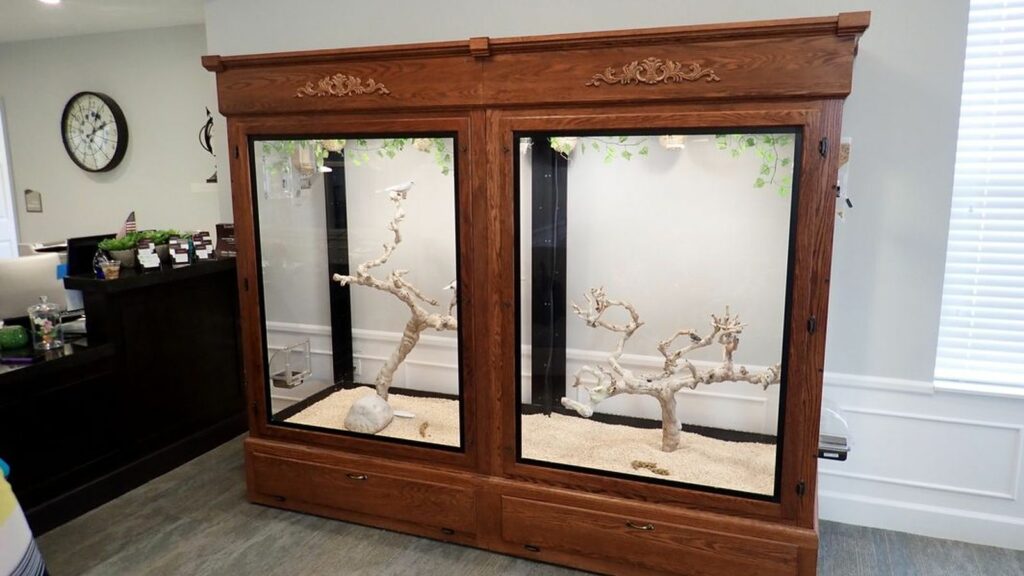Estimated Read Time: 7 minutes
Transitioning from independent living to a nursing home setting can be a significant challenge.
Many communities have found that allowing pets in their home can greatly reduce residents’ stress, uncertainty, and loneliness.
Nursing home pets may pose some risks, but certain animals and activities offer emotional support that so many residents need, without sacrificing safety.
In this post, we’ll cover some animals that we think would be the best pets for nursing homes!
Dogs as Companions
A dog is known as a “man’s best friend” for a reason.
They quickly become integral parts of any adopting family, as their unconditional love helps us through good times and bad.
Studies have found that they understand our emotions so well, that they can detect when we’re overly stressed, sad, or depressed, and try to console us. This can be an incredible outlet for residents in nursing homes.
Each person has a dog breed preference, but some are better suited for nursing homes than others.
Here are a few breeds we think are great for this setting.
Pug

Pugs are small, easy to care for, very friendly, and adaptable.
They are good at making friends with humans and other dogs, which is vital in pet-friendly communities.
Also, they are lazier than most and have a fun nature about them.
Poodle

Poodles are generally small, easy to maintain, and don’t shed.
They’re also one of the smartest breeds out there and are known for being docile and gentle.
Poodles take very well to humans and other dogs, making them great companions in nursing homes.
Cocker Spaniel

Cocker Spaniels are very intelligent, affectionate, and gentle towards humans and other dogs.
This species has a thick coat and they do shed, but they shed much less than others.
They require a little higher maintenance and grooming because of the thick coats, but their loving and docile nature makes them excellent companions.
Disadvantages of Dogs as Resident Pets
Some concerns are a tripping hazard, certain allergies, biting, scratching, and loud barking. Even though the breeds above are generally calm, gentle, and friendly, there can be outliers.
Another issue is caring for and treating dogs, as this will take extra care and coordination with vets to house dogs with your residents.
Cats as Companions
Characteristics that make cats suitable for a nursing home:
- Generally easy to take care of
- Require less attention than dogs
- Sleep most of the day
- Enjoy more confined spaces
- Very affectionate towards their owners
But just like dogs, some felines are better suited for a nursing home than others.
Here are 3 cat breeds we think can thrive with seniors in nursing homes and assisted living communities.
Ragdoll

The Ragdoll cat is a great option for seniors.
This breed is easy to take care of, calm, and affectionate towards its owner.
For a cat to be happy and cooperative in a nursing home setting, it must be somewhat low-energy and gentle, and the ragdoll breed checks off these boxes.
Birman

Birman breeds are playful, gentle, and affectionate.
They are active and curious, but still find happiness in small rooms with minimal entertainment.
They’re great pets for homes with children and adults because of their kind demeanor and easy-going personality.
They’re also not typically bothered by other cats, dogs, or humans in their space.
Persian

The Persian breed is fluffy, cuddly, and very calm.
They’re also great pets for older adults because they don’t require a significant amount of entertainment.
Persians will enjoy the toys they have, the affection of their owner, and a comfy place to sleep.
Disadvantages of Cats as Resident Pets
Cats are amazing companions, but they’re very independent. Sometimes that independence leads to them doing things we tell them not to do.
The unpredictability of cats can create problems like a fall hazard, damaged equipment, scratching, and biting.
There’s also an added level of care needed, like cleaning litter boxes and providing areas for climbing and hiding, which may not be available in some spaces.
And, just like dogs, cats may get sick or experience other issues. Extra care may be needed by your staff, whether it be administering treatment or making visits to the vet.
Visitation Therapy with Cats and Dogs
If your nursing home doesn’t allow personal pets, visitation therapy is always encouraged. Some organizations may even offer animal visitation at no charge to you.
Trained therapy dogs and cats have proven to give residents mental and physical benefits with fewer safety concerns.
In memory care units, for example, pet visitation is an excellent form of sensory therapy for Dementia patients.
Visitation therapy also provides the benefits of a pet, without needing constant care for the animal. We recommend these sessions relatively often as they bring so much joy to those in long-term care.
Here’s an article by the Nursing Home Law News for tips to ensure these sessions are safe, clean, and healthy for each resident.
Fish as Companions

If you feel the cons outweigh the pros of dogs and cats, you can look to fish as another companion.
Spending time around an aquarium fish is safe, predictable, relaxing, and most importantly, therapeutic.
In fact, nursing homes aquariums offer many health benefits:
- Lower blood pressure
- Improve sleep
- Improve nutritional intake
- Fewer feelings of loneliness
- Increased focus for memory-loss patients
- Decrease in disruptive behaviors
When you lease an aquarium through Serenity USA, cleaning and maintenance will be taken care of for you! We also include the fish, decor, equipment, and replacements for no upfront cost and a low monthly fee!
Disadvantages of Fish as Companions
A main disadvantage of an aquarium is keeping the water clean and the fish healthy. An aquarium may also be more expensive than activities like animal visitation therapy.
Analyze your nursing home’s budget and the interests of your residents to determine if the ease of care and health benefits outweigh the costs of leasing an aquarium.
Birds as Companions


Another low-maintenance option that offers healthy engagement is a bird aviary from Serenity USA!
Sporadic movements, bird songs, and vibrant colors contribute to improved focus and engagement. Plus, a bird aviary encourages people to gather and discuss the birds’ species, colors, and songs!
Much like an aquarium, observing birds in a spacious aviary offers certain health benefits to residents:
- Decreased stress
- Increased feelings of happiness
- Increased focus and engagement
- Decreased disruptive behaviors for memory-loss patients
We fabricate our custom bird aviaries in-house and provide routine services for cleaning, maintenance, and bird health checks!
Disadvantages of Birds as Companions
Much like an aquarium, a large aviary may be more pricy than animal visitation or other similar activities.
Also, birds are less hardy than cats and dogs. Bird loss is always a possibility, and that could put a strain on some residents. Through our proprietary products and care practices, we strive every day to minimize this for our clients.
Conclusion
So, what are the best pets for nursing homes?
Cats and dogs provide excellent emotional support for residents. They act as a form of consistency when making a tough transition from independent living to a nursing home.
They do carry some unpredictability that could cause problems, but pet visitation with trained animals is an excellent option.
To eliminate the concerns of allergies and other safety issues, fish and birds may be the best pets for nursing homes. Another benefit is that the birds and fish are there all the time, so your residents won’t have to wait for a therapy session!
Considering your budget, resident preferences, and the layout of your nursing home, what pets do you think will be best in your community?